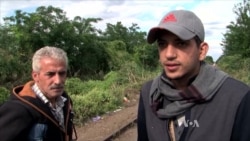Mahmoud Ali Hassan left Syria two weeks ago with his father and three friends. They have only half a kilometer down the old abandoned rail tracks to the Hungarian border. His mother stayed in a Palestinian camp in Lebanon to wait until they reach their final destination – the Netherlands.
They stopped briefly before the border to rest and decide what to do next.
“We are close to Hungary and we fear that they want to detain us and take our finger prints. We stopped to see what options we have. We don’t want to be detained and beaten. Macedonian police beat us, including my father, who is an older person,” said Mahmoud.
After a few moments they conclude that because of Mahmoud’s father they could not enter Hungary overnight and avoid being registered by Hungarian police. Before leaving Serbia, Mahmoud told VOA his story.
“We left our country because of the war. I want to continue my engineering studies. I was a junior but I had to interrupt my studies because it is not safe in our country. Even the university is closed,” he said.
Over the last few days the situation on the Serbian-Hungarian border has been reaching a critical point. Just over the last 24 hours the refugee camp in Kanjiza, close to the border, has accepted 5,000 migrants.
The conditions became more acute after Hungary announced that it would implement a new policy after September 15, including more severe punishment for entering the country illegally. The waves of migrants have intensified. For now, they have been crossing the border without problems and Hungarian authorities are placing them in a refugee camp in Roeszke.
While Hungarian authorities continue to work on the border fence, migrants consider the latest news: that those who are registered by the Hungarian police can continue their journey to Germany without delay, based on the promise of German Chancellor Angela Merkel.
However, asylum seekers who do not want to go to Germany have a problem, and after the sunset the majority will try to enter Hungary undetected and avoid registration. They rest while awaiting the night.
“I am waiting and I am very tired. After sunset I will enter Hungary. Hungary is the problem. In Serbia we did not have any problems. Hungary is the problem,” said one refugee.
Tamam, another Syrian refugee, plans to board the train for Vienna in Budapest and reach Belgium via Germany, to continue his IT studies
“I am from Syria and I left because of the war. Now I am at the border waiting for the night. I want to cross the border without being caught by the police. My next stop is Budapest,” said Tamam.
He had a very turbulent and dangerous trip to the Serbian-Hungarian border, which lasted several weeks. He was arrested twice and crossed the sea over six-meter waves. Greek police took his cell phone and threw ut into the sea.
“Turkish navy than intercepted the boat on which we tried to reach Greece again. They put us in jail for seven days,” Tamam recalled.
The night when Tamam and other Syrian refugees hoped to reach Hungary was very cold, with temperatures reaching 7 degrees Celsius. The summer is almost over and rain and colder days are becoming more common, which will bring new problems for migrants making their way to the Serbian-Hungarian border.
This report was produced in collaboration with the VOA Serbian service.





